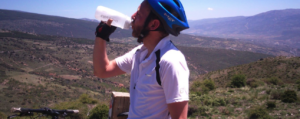Sports science provides data-based evidence related to exercise. How can we make the best use of that information and apply it for ourselves? Today’s podcast episode helps us do just that.

Getting to talk to scientist is a special treat of the Strength Running Podcast. We get to dig in to the actionable parts of their research and level up our running.
Science paired with anecdotal evidence drives change in the field. You can see the evolution in how we now understand:
With data often comes the very natural question: but will it work for me? That’s where we have to experiment and see what yields results.
Some of us may have the guidance of a coach, some of us have a community to reach out to, and others may be training on their own. Regardless of your situation, today’s podcast brings new ideas on methods to try and ones to let go of (we’re looking at you, ice baths).
Phil Hayes Sheds Light on the Research Data
Professor Phil Hayes is a senior lecturer at Northumbria University where he spent 14 years as the leader of the Applied Sport and Exercise Science Program. He researches muscle strength and how it affects running performance, form, and injury risk.
Phil is a UK Athletics Level 4 running coach and has experience coaching kids, adults, and world-class athletes. His new book, The Science and Practice of Middle and Long Distance Running, weaves together sports science and the art of coaching runners.
Today’s conversation is a highlight of those principles and an exploration of how they can be applied. We can all stay up to date on the best practices of the sport and experiment wisely with our sample size of one, as a coach would:
In this episode, we cover many topics from how to structure a training plan to outdated approaches. We talk about:
- Significant of a training log and which metrics to pay attention to
- Periodization and progression over time
- Dynamic warm-ups versus priming activities
- New frontiers of running such as fatigue resistance
You’re sure to have some great takeaways from this podcast. Check out the full episode below.
Subscribe to the podcast in Apple Podcasts, Spotify, Stitcher, iHeartRadio, or Google Play.
Links & Resources from the Show:
Thank You InsideTracker!
Our show is supported by our longtime sponsor InsideTracker. Today, more than ever, it’s essential that we’re making the right decisions to keep our bodies healthy. To help us be resilient, prevent over-training, and optimize our running to get the most from it.
InsideTracker is the ultra-personalized nutrition platform that analyzes your blood and DNA biomarkers along with your lifestyle habits to help you optimize your body and reach your goals.
InsideTracker’s patented system will transform your body’s data into knowledge, insights, and a customized action plan of science-backed recommendations. The data can help you determine whether you’re running too much, not enough, or have some other issues that could be affecting your recovery or performance.
I’ve had my own blood drawn with InsideTracker several times and have been amazed at the valuable information that they provide. Not only are the results very detailed, but they also share guidance for how to improve any markers that are out of range.
If you’re ready to take control of your health and optimize your training, InsideTracker offers a selection of plans that best suit your needs with a limited time 25% discount.